5 June 2020
Republican News and Jimmy Steele - 50th anniversary
Remembering the Past
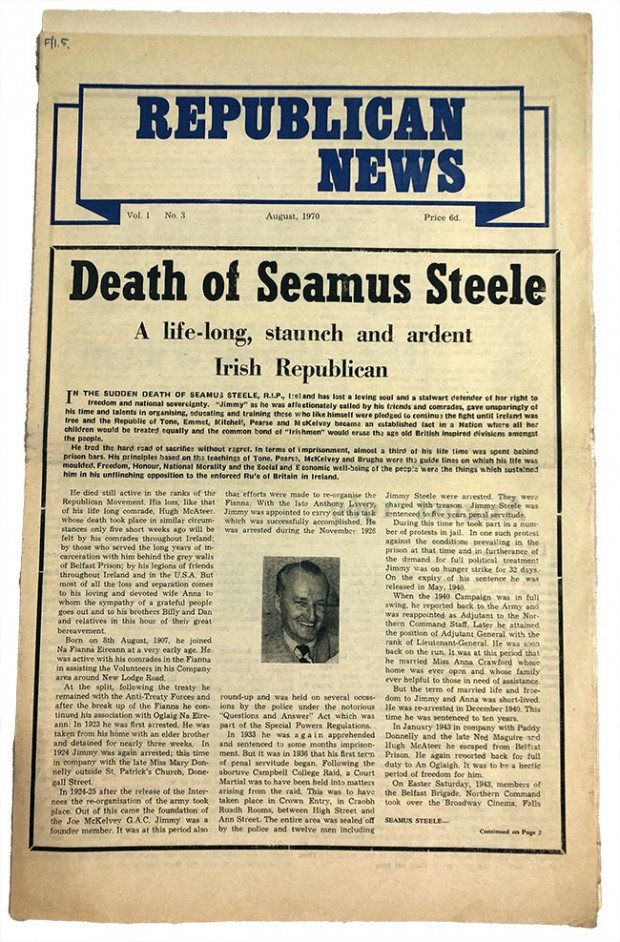
By Mícheál Mac Donncha
The split in the IRA and Sinn Féin led to the establishment of An Phoblacht as the national republican newspaper in January 1970. Six months later republicans in the Six Counties founded Republican News under the editorship of Jimmy Steele.
The need for an additional paper in the North was felt given the torrent of events that were occurring as the Orange state lurched from crisis to crisis, with nationalist districts under siege from the RUC and loyalists and with the British Army playing an increasingly aggressive anti-nationalist role.
Jimmy Steele brought to his position as editor a lifetime of experience as an active IRA volunteer. Born in 1907 in Belfast, he joined Fianna Éireann and then the IRA. He was only 16 when he was first arrested, an experience repeated many times in the ‘20s and ‘30s. He was one of 12 republicans arrested in Belfast’s Crown Entry in 1936, leading to their famous trial for treason. Steele was sentenced to five years in Crumlin Road Prison.
Released in 1940 he was re-arrested in December of that year and received a ten-year sentence. In January 1943 Jimmy Steele escaped from Crumlin Road with Hugh McAteer, Paddy Donnelly and Ned Maguire. That Easter he and McAteer appeared on stage at the Broadway Cinema on the Falls Road when the IRA took it over for an Easter commemoration, a popular and daring snub to the British regime at a time of intense repression. Jimmy Steele served several more terms of imprisonment in the ‘40s and ‘50s, his final release being in 1960.
A writer of articles and poems for republican journals, Steele edited the papers Glór Uladh and Resurgent Ulster between 1951 and 1957. He later edited the booklets ‘Belfast Patriot Graves’, ‘Antrim’s Patriot Dead’ and ‘Belfast in 1916’. He was centrally involved in the National Graves Association and ensured the successful completion of the Co. Antrim Republican Memorial in Milltown Cemetery.
Steele pledged his allegiance to the Provisional Army Council in 1969. He was appointed Publicity Officer of the Belfast Brigade and in that capacity established Republican News as a monthly republican journal for the Six Counties. The first issue appeared in June 1970. It was a crucial period as the British Army became increasingly aggressive and was being seen in its true role as an occupying force by growing numbers of nationalists. This was seen most clearly in the Falls curfew of 3-5 July.
Steele in Republican News brought the traditional republican analysis to the situation, highlighting the reality of British imperialism then and in the past. He also used its pages to stress the anti-sectarian nature of republicanism, writing of Protestant patriots and appealing to the unionist population as fellow Irish people.
His editorship was to be short-lived, however, as, after two issues of Republican News, Steele died on 9 August 1970. The paper continued until its amalgamation with An Phoblacht in 1979.
The first issue of Republican News appeared in the first week of June 1970, 50 years ago this week.
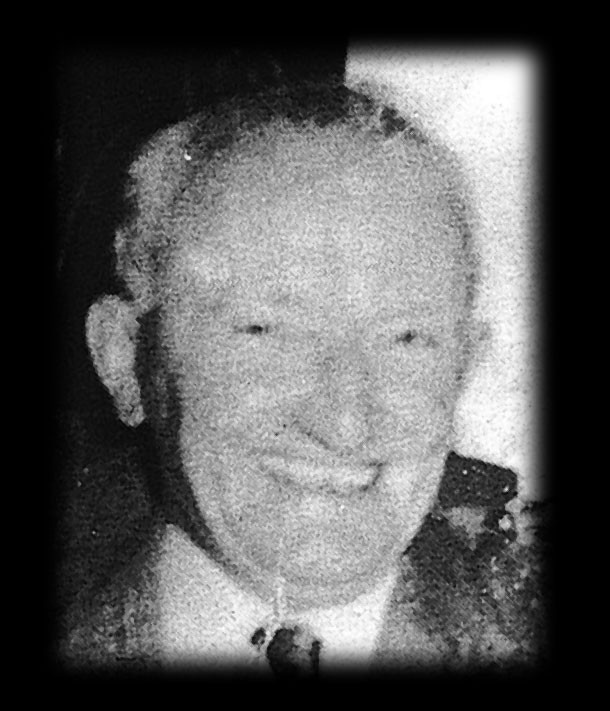
Jimmy Steele – The life of a Belfast republican
From An Phoblacht/Republican News, 29 August 1985
By Pat McGlynn
JIMMY STEELE, soldier, writer and poet, a man who devoted his life to the Republican Movement and the cause of Irish freedom, died on 9 August 1970. Although he shied away from the public eye, preferring to work behind the scenes, he was known, admired and respected by his numerous friends and comrades in Belfast and throughout the length and breadth of the country.
Steele, the second-youngest in a family of six, was born in the New Lodge Road, Belfast, on 8 August 1907. His father, Arthur Steele, a native of Randalstown, County Antrim, was employed as an engineer in Harland & Wolff, the shipbuilders in Belfast. From an early age, following the death of his mother, Steele and his four brothers (Charlie, Arthur, Liam and Dan) were reared by their grandmother and aunt. His only sister died in childhood.
He served his apprenticeship and worked for several years as a plasterer but was forced to give it up due to bad health and found employment as a bread roundsman.
Steele joined Fianna Éireann in 1919 and from then on he gave unsparingly of his time, talents and energy to the republican cause. Although he was a member of Fianna for only a few short years before joining the IRA, Steele always remained very close to the Fianna up until the time of his death.
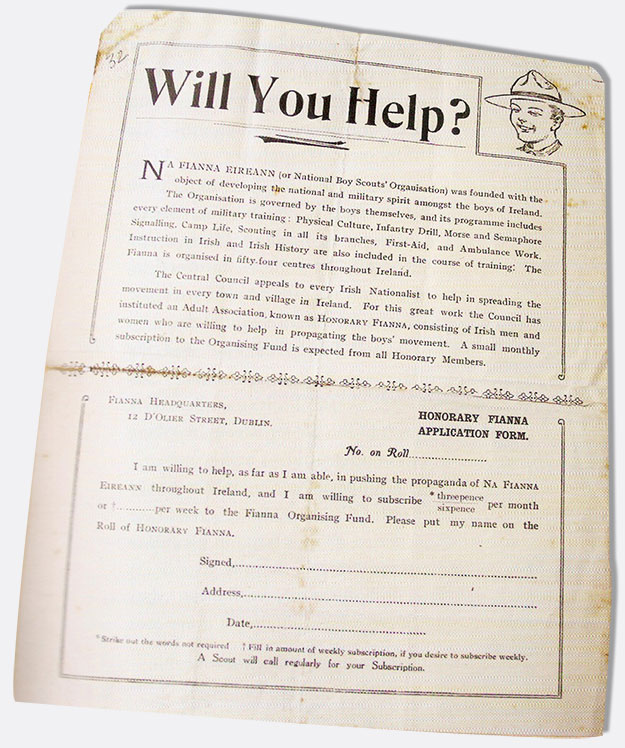
As a member of the Fianna he was active with his young comrades in assisting the Volunteers in his own area around the New Lodge Road during the Tan War. Following the Treaty of 1921, and the split in the Republican Movement, Steele remained true to his republican principles and continued to assist the IRA.
In the early 1920s, he joined the IRA and became one of the youngest Volunteers in the Belfast Brigade. He was first arrested in 1923 when, along with his brother, he was taken from his home and detained for a short period.
In 1924, he was again arrested and held for several months. Following his release later that year and the release of the internees in 1925, he assisted with the reorganisation of the IRA in Belfast. Along with Anthony Lavery, he was appointed to reorganise the Fianna and held a position on the Command Staff until the mid-1930s.

• Joe McKelvey Gaelic Athletic Club (Jimmy, front middle)
During this short period of freedom, Steele was a founder member of the Joe McKelvey Gaelic Athletic Club. The Gaelic football team was entirely composed of IRA Volunteers. Steele, who was very fit and agile, was a good footballer, though he was a hard and sometimes rough tackler.
He was rearrested and imprisoned several times over the following years, the longest period being in 1933 when he was sentenced to several months’ imprisonment.
On his release he was appointed Adjutant to Anthony Lavery, the O/C of the IRA’s Belfast Battalion.
Following the abortive raid on the armoury of Campbell College on 24 December 1935, the IRA convened a court-martial of which Lavery, the Battalion O/C, was to be tried for contravening an Army order in allowing three of the four Volunteers arrested after the raid (and who had nothing to do with it) to recognise the court.
Shortly after the court-martial convened in the rooms of the Craobh Rua Club at 10 Crown Entry in Belfast city centre on 25 April 1936, the RUC, acting on the information of an informer, swooped and arrested 13 men, including Steele, the entire Belfast Battalion Staff, most of the Northern leaders and the Adjutant General, Jim Kileen.

• False ID used by Jimmy
The men were charged on 29 May with “treason felony”, an archaic charge originally devised for John Mitchel, the Young Ireland leader, in 1848 and last used against the Fenian Thomas Clarke during the 1880s.
In a celebrated case which went on for months and attracted huge publicity, the 13 were eventually found guilty before the City of Belfast Commission in July. Steele was sentenced to five years’ penal servitude in Crumlin Road Jail.
Upon his release in May 1940, Steele immediately reported back to the Army and was appointed Adjutant to the Northern Command Staff, which was overseeing the campaign at that time. He was later promoted to Adjutant General.
While on the run he married Anna Crawford, a member of Cumann na mBan who came from a staunch republican family from North Queen Street, Belfast. They were to have been married in 1936 but this had to be postponed due to his arrest and imprisonment. Married life in freedom was to be short-lived, however. Within a period of five months, he was released, married and rearrested. From 1935 to 1950, Steele never spent a Christmas at home. During this period Jimmy Steele spent 15 years in prison with the exception of five months in 1940 after his release and five months in 1943 following his jail escape.
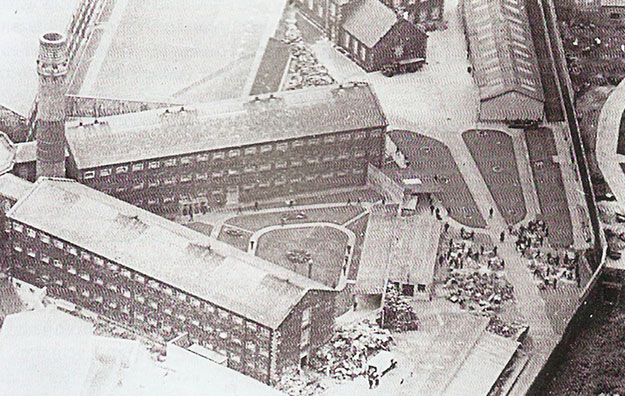
• Crumlin Road Jail
On 6 December 1940, he was once more arrested. Charged with possession of documents, money and a revolver, he was sentenced to ten years’ imprisonment. In ‘A Wing’ of Crumlin Road Jail, where the sentenced prisoners were held segregated from the internees, Steele, a fluent Irish speaker, held Irish language and history classes for small groups of prisoners. He also held classes on various military topics.
The most famous escape from Crumlin Road Jail of that period was by Steele and three comrades – Hugh McAteer, Ned Maguire and Paddy Donnelly. On the morning of 15 January 1943 they escaped through the roof of the jail, scaled the wall, rushed out of the main gate and mingled with the passersby on the Crumlin Road. Within 15 minutes they were in a prearranged safe house.
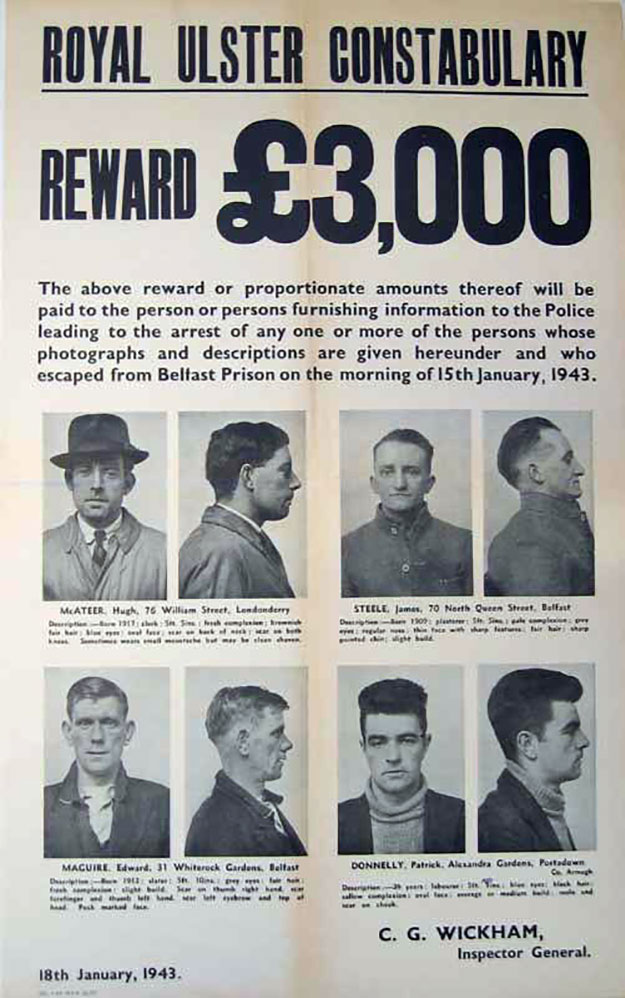
On the run once more and with a reward of £3,000 being offered for his capture, Steele reported back to the Army and was appointed Adjutant of the Northern Command.
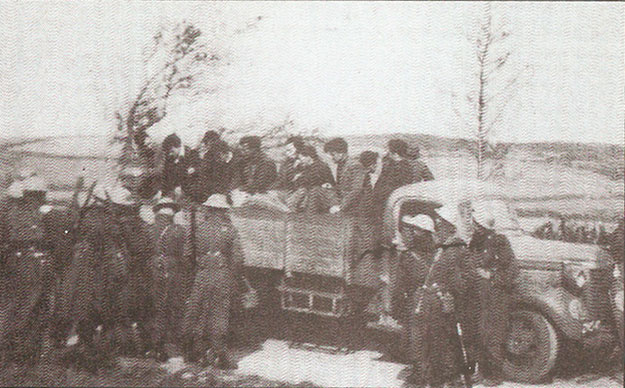
• Some of the prisoners captured after the Derry Jail escape
Steele figures in two spectacular operations during his brief period of freedom. The first of these was the Derry Jail escape. In March, along with Liam Burke and Harry White, he organised and assisted in the escape of 22 IRA Volunteers from Derry Jail.
The following month he participated in the Broadway Cinema hold-up on the Falls Road. On Holy Saturday, despite a large RIC presence in the area, 16 Volunteers took over the cinema and held an Easter commemoration. From the stage, Steele read the 1916 Proclamation and McAteer read a statement from the IRA. The commemoration created a sensation and gained considerable publicity for the IRA at the time.
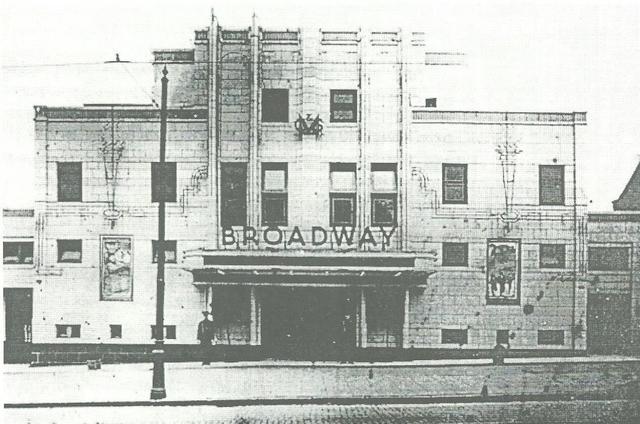
• Broadway Cinema, Falls Road
By May, Steele was back in, jail, this time sentenced to 12 years. Conditions for penal servitude prisoners in Crumlin Road Jail during the 1940s were harsh. All the gains of the previous decade in terms of being accorded political status were disallowed and had to be fought for again.
While hunger strikes continued, a new tactic was introduced – the strip strike. This was a refusal to wear convict clothes but was also used in protest against the general conditions which, especially in Crumlin Road Jail, were appalling. So a strip strike was started in mid-June 1943 by the sentenced republican prisoners in ‘A Wing’ of the prison.
Twenty-two prisoners, including Steele, took off their prison clothes and sat naked in their cells. The prison authorities retaliated by taking away other articles from their cells. Bedding and blankets were removed at 7:30am and were not returned until 8:30pm. The strip strike (which was very similar to the H-Blocks protest 40 years later) continued for about three months but was called off to allow one of the prisoners to receive urgent medical treatment.
Conditions did improve, however, as time wore on, but the improvement was achieved only by hunger strikes and non-co-operation by the prisoners. Steele fasted for 31 days before the strike was ended.
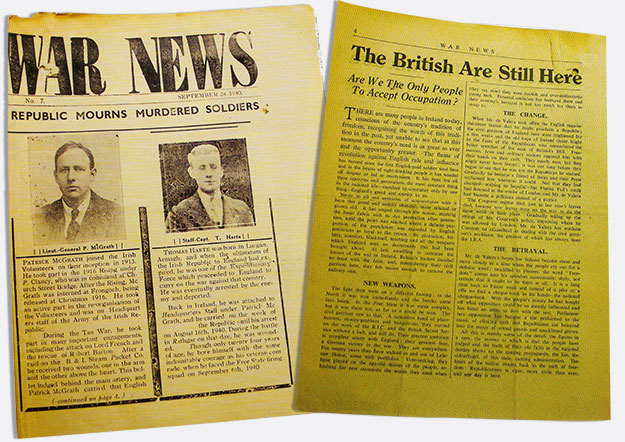
A prolific writer, Steele, who during his brief period of freedom in 1940 had edited the War News, continued to contribute to the paper while in prison. He also provided articles for other republican journals, such as An tOglach and The Critic, all of which had to be smuggled out.
“Writing was Steele’s speciality,” recalls Joe Cahill. “He always had to have some sort of paper going. Even while in prison during the 1940s, he produced a hand-written paper containing historical articles and articles on the Republican Movement which was circulated throughout Crumlin Road Jail. The paper always contained a light-hearted page similar to the Liam Óg column in today’s An Phoblacht/Republican News.”
A poet of considerable ability, Steele, who had already quite a number of poems published in many republican papers, continued to write poetry while in jail. Some of his best-known poems were written in Crumlin Road Jail, Belfast Graves and several poems written in memory of his fallen comrades, including Terence Perry, Seamus Burns and Gerard O’Callaghan.
Steele was a devout and practising Catholic and this is very much reflected in many of his writings. “Although he was deeply religious,” recalls the Belfast republican Liam Burke, “he was the first to denounce the clergy when they attacked the Republican Movement.”
In August 1950, Steele was still imprisoned, the last political prisoner of that era still in Crumlin Road. With his eventual release the following month it was the first time since partition that Crumlin Road Jail was empty of political prisoners.
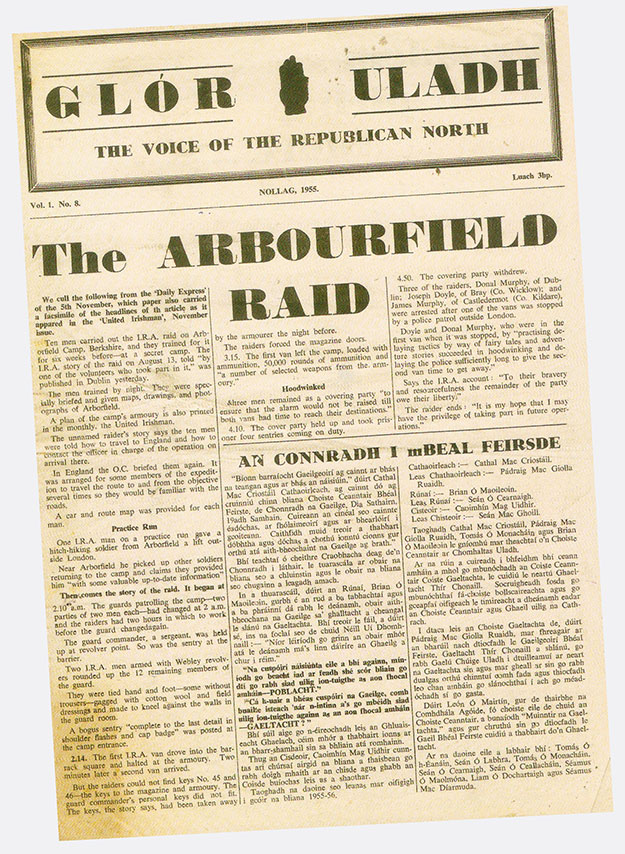
In 1951 he became editor of the Belfast papers, Glor Uladh and Resurgent Ulster, a position he held for the next six years.
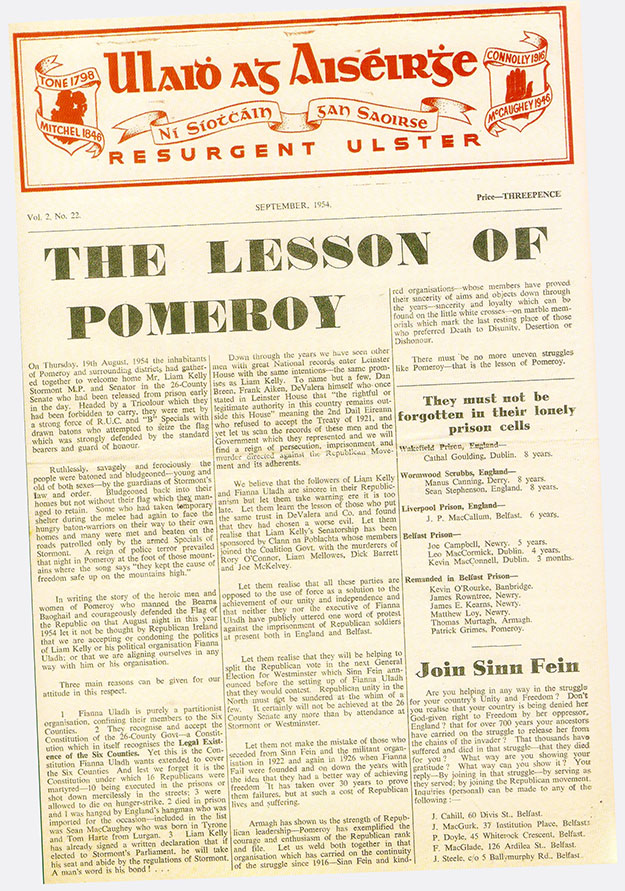
During the early 1950s, Steele became involved in the Belfast branch of the National Graves Association and was the driving force behind the erection of the County Antrim memorial in Milltown Cemetery, Belfast. A dedicated and tireless worker on behalf of the NGA, Steele believed that the sacrifices of the Volunteers should be acknowledged and recorded.
In 1953 he edited and was the main author of Antrim’s Patriot Dead (the predecessor of the recently-published Belfast Graves), and ten years later produced a small booklet, Belfast’s Patriot Graves, recording the Roll of Honour of Belfast martyrs up to Brendan O’Boyle who died in 1955.
On 21 December 1957, following the beginning of the IRA’s Border Campaign, internment was once more introduced in the North. Steele was among the 167 republicans to be interned in Crumlin Road Jail.
Political treatment, last won by hunger strikes and other protests during the years 1938 to 1945, was not automatically accorded. Steele, who would never submit to prison rules, led the men in a protest strike and eventually political status was acknowledged.
After being interned for three years he was released in 1960 and immediately reported back to the Army.
In 1963, Anna and Jimmy were heartbroken by the tragic death of their young son, Colm. Colm, an only child, was just nine years of age when he was knocked down and killed by a car while on a pedestrian crossing. Steele was deeply affected by the shock of Colm’s death and it was Anna who, once again, helped him to endure a bitter and tragic blow.
With the ending of the Border Campaign an Army Convention was held at Maghera, County Derry, where less emphasis was placed on armed struggle than in directing the IRA towards reformist agitation.
Steele, like many other republicans, was gravely disturbed by the infiltration of the Republican Movement by members of the Irish Workers’ Party and the Connolly Association in England, and the influence which people like Roy Johnston exerted on the leadership.
By the mid-1960s many of these infiltrators had become the ‘masterminds’ and policy makers of the Republican Movement.
While many republicans were expelled or ousted during this period, and many more drifted away, Steele stood his ground and was determined to do something to stop the betrayal of the republican cause.
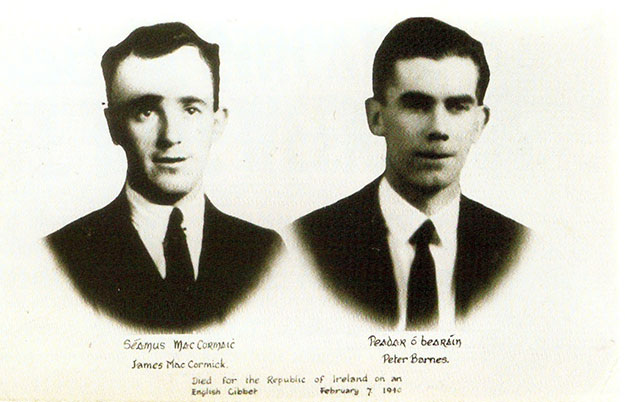
His opportunity eventually came when in 1969 it was announced that the remains of Peter Barnes and James McCormick were to be brought home to Ireland for burial.
Barnes and McCormick had been executed in England in February 1940 for their alleged part in the Coventry bombing in August of the previous year. For years the Barnes & McCormick Repatriation Committee, of which. Steele was a member, had been campaigning for the return of their remains.
The forthcoming reinterment of the bodies in July 1969 was seen by a group of Belfast republicans (who, like Steele, were deeply concerned about the direction the Movement was taking) as an opportunity to publicly denounce the leadership.
The Repatriation Committee proposed that Steele be accepted as the official speaker to deliver the oration at Ballyglass, Mullingar, County Westmeath. He put a lot of preparation into his speech. Steele and the other republicans who supported him knew that in criticising the policies being pursued by the leadership that they were expressing the feelings of many true republicans throughout the country.
Assisted by Joe Cahill and Jimmy Drumm, and after much discussion, Steele wrote the final draft of the oration he proposed to give at Mullingar. He knew that by giving such an oration he would almost certainly be dismissed from the Republican Movement. Undeterred, he was determined to say, and to say in public, what so many republicans felt and had discussed privately.
The Repatriation Committee recommended to the Army Council that Steele be the official speaker at Ballyglass. However, Cathal Goulding, the IRA Chief of Staff, refused to accept him and said that Jim O’Regan from Cork had been appointed by the Army as the official speaker.
The Repatriation Committee selected Steele as their official speaker and it was eventually agreed that he and O’Regan would speak on Sunday, 6 July 1969. Steele spoke first and in a fiery oration he severely criticised the policies of the Republican Movement, the attitude of the leadership that the struggle for civil rights was a process by which the Six-County state could be reformed, and finally the running-down of the IRA.
Steele in conclusion reminded those present what Barnes and McCormick had died for and urged republicans to abandon the new policies of the Movement and to support the armed struggle.
The oration was warmly applauded and after the ceremonies many republicans, especially those who had participated in the 1939 campaign, congratulated him on taking such a courageous stand. Many of the estimated 10,000 people present were delighted that at last someone, and especially a sincere republican such as Steele, had spoken out publicly about the direction the Movement was taking.
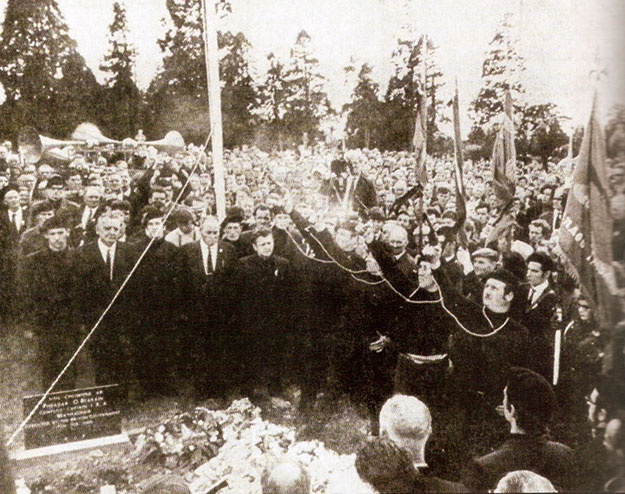
• Peter Barnes and James McCormick reinterment
Sinn Féin President Tomás Mac Giolla and Goulding were furious over the oration and urged O’Regan to contradict what Steele had said. O’Regan, who was supposed to be the main speaker, before beginning his speech told Goulding that “you can’t contradict the truth” and then proceeded to give a very mild oration in comparison to Steele’s.
Steele’s speech was the first public opposition to the policies being pursued by the leadership and halted the trend in the Republican Movement. In many ways, Steele’s oration was an indication to many republicans of what lay ahead for the Movement, and within six months the inevitable split had occurred and the elements so severely criticised by Steele became known as ‘Official Sinn Féin’, now the Workers’ Party.
Two weeks later, Steele was dismissed from Óglaigh na hÉireann and the Republican Movement because of his oration at Mullingar. He was, however, given the right to appeal for a court-martial but by August 1969 more pressing issues confronted Steele and other republicans in Belfast.
During the pogroms in Belfast, Steele was very much to the fore and assisted with the rearming of IRA units to defend nationalist areas. He became a member of the newly-organised Belfast Brigade Staff as Publicity Officer and, following the split in the Army, was elected to the Provisional Army Executive, a post he held until his death.
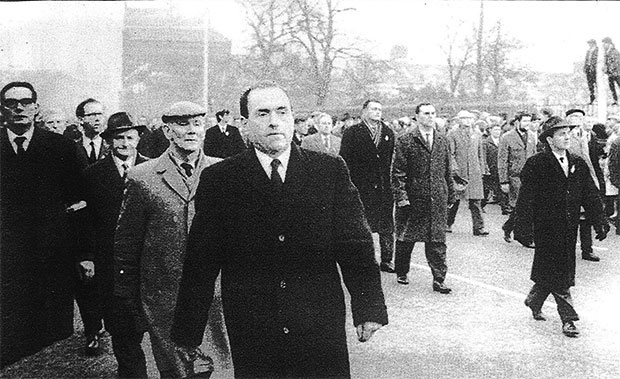
• The Belfast Easter Commemoration in 1966, the 50th anniversary of the 1916 Rising. Among those in the photograph are John O'Rawe, Tony Corry, Jimmy Steele (4th from left), Joe Campbell, Kevin McQuillan, Jimmy Drumm and John Kelly
The arrival of British soldiers on the streets of Belfast on 15 August 1969, following the loyalist pogroms against nationalist areas, and the welcome they received from the people frustrated Steele. This was compounded by the hostile attitude of the people towards the Republican Movement, and the IRA in particular, which was accused of deserting them in their hour of need.
However, the rapid reorganisation and the rearming of the IRA during September and October 1969, the ability of local units to take offensive action against the loyalists and British Army in early 1970, and the change in attitude of the people, who now saw that the British soldiers were the real aggressors, delighted Steele.
Within weeks of the split in the Republican Movement in January of 1970, Steele conceived the idea of founding a republican paper for circulation in the six occupied counties. A paper committee (which included himself, Leo Martin, Hugh McAteer, Seán Malone, George Mackie and several others) was formed and met over a shop at the corner of Clonard Gardens and Bombay Street, Belfast.
The first issue of the paper, named Republican News, appeared in March 1970 with Steele as editor. “While others assisted with Republican News,” recalls a longtime friend and comrade of his, “it is only fair to say that without Jimmy Steele, who was the driving force behind the paper, which was almost exclusively written by him, Republican News would not have appeared”.
It was with the establishment of Republican News that Steele’s true talents emerged. A prolific writer, he had a natural flair for journalism and for publicity in particular. Under his editorship, the four-page weekly paper soon had a circulation of 15,000 copies per week. He continued to edit the paper until his death in August 1970.
Anna Crawford, who married Jimmy in 1940, not only supported him during the long years of imprisonment but is a committed republican herself. She suffered the added hardships of deprivation and loneliness that is still endured by many women in Ireland today. Anna, like Jimmy, never wavered in her steadfast republican beliefs.
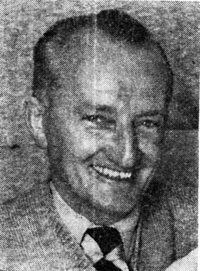
Jimmy Steele spent over 20 years of his life in prison for his ideals but such was his determination and his enthusiasm for the attainment of the Republic that he was still working hard for the cause right up to the time of his death. He died, aged 63, still active in the ranks of the Movement, on 9 August 1970, just five weeks after the death of his lifelong comrade, Hugh McAteer.
Fifteen years after his death, it is only right that we should remember Jimmy Steele, a true republican who followed in the footsteps of Tone, Mitchel, Rossa, Pearse, Brugha, McKelvey and McCaughey.
Jimmy Steele’s life and work in the cause of Irish freedom should be an example to all of us, from which we should draw strength and inspiration to continue the fight for which he laboured all his life.
Follow us on Facebook
An Phoblacht on Twitter
Uncomfortable Conversations

An initiative for dialogue
for reconciliation
— — — — — — —
Contributions from key figures in the churches, academia and wider civic society as well as senior republican figures




